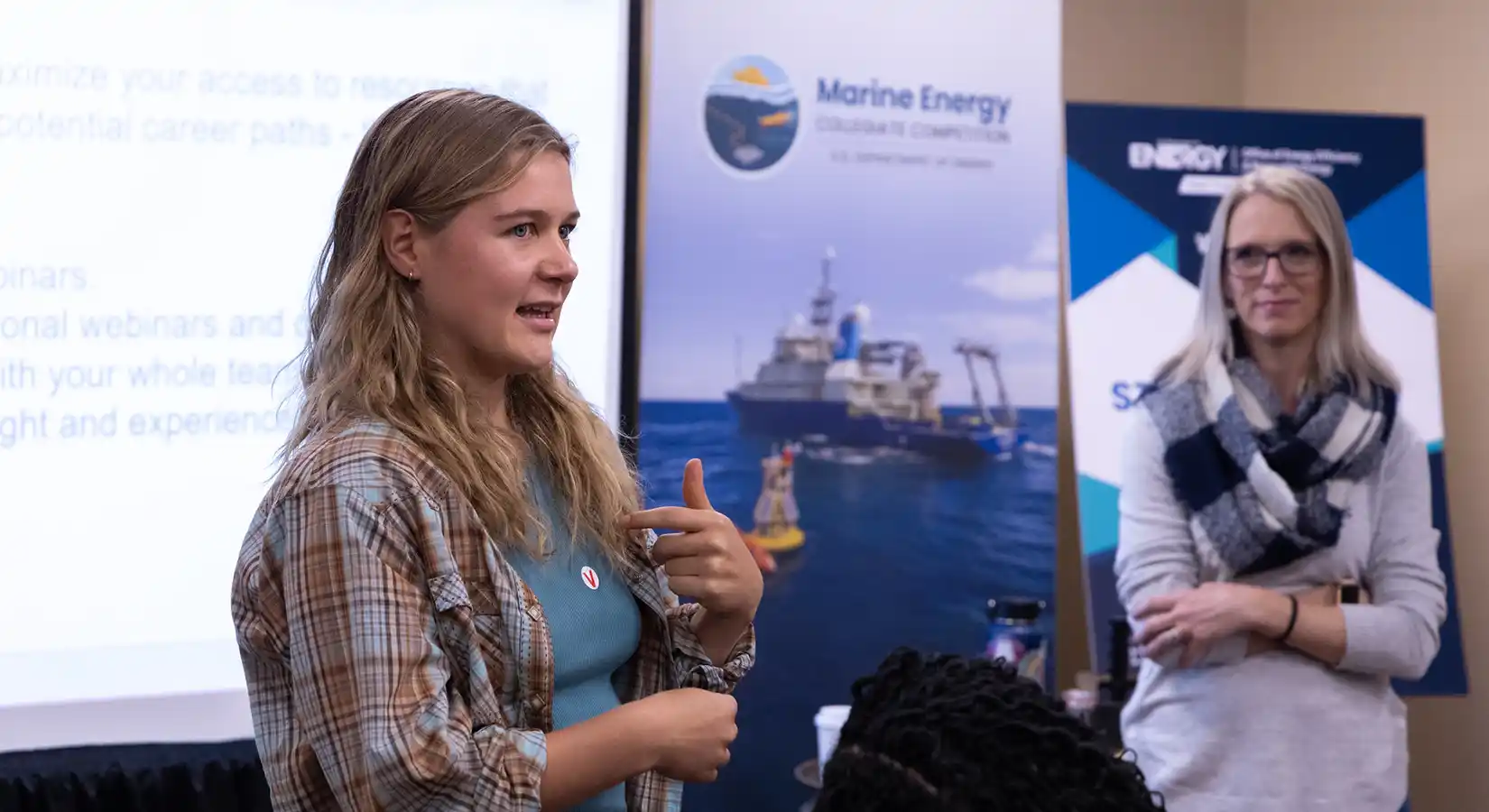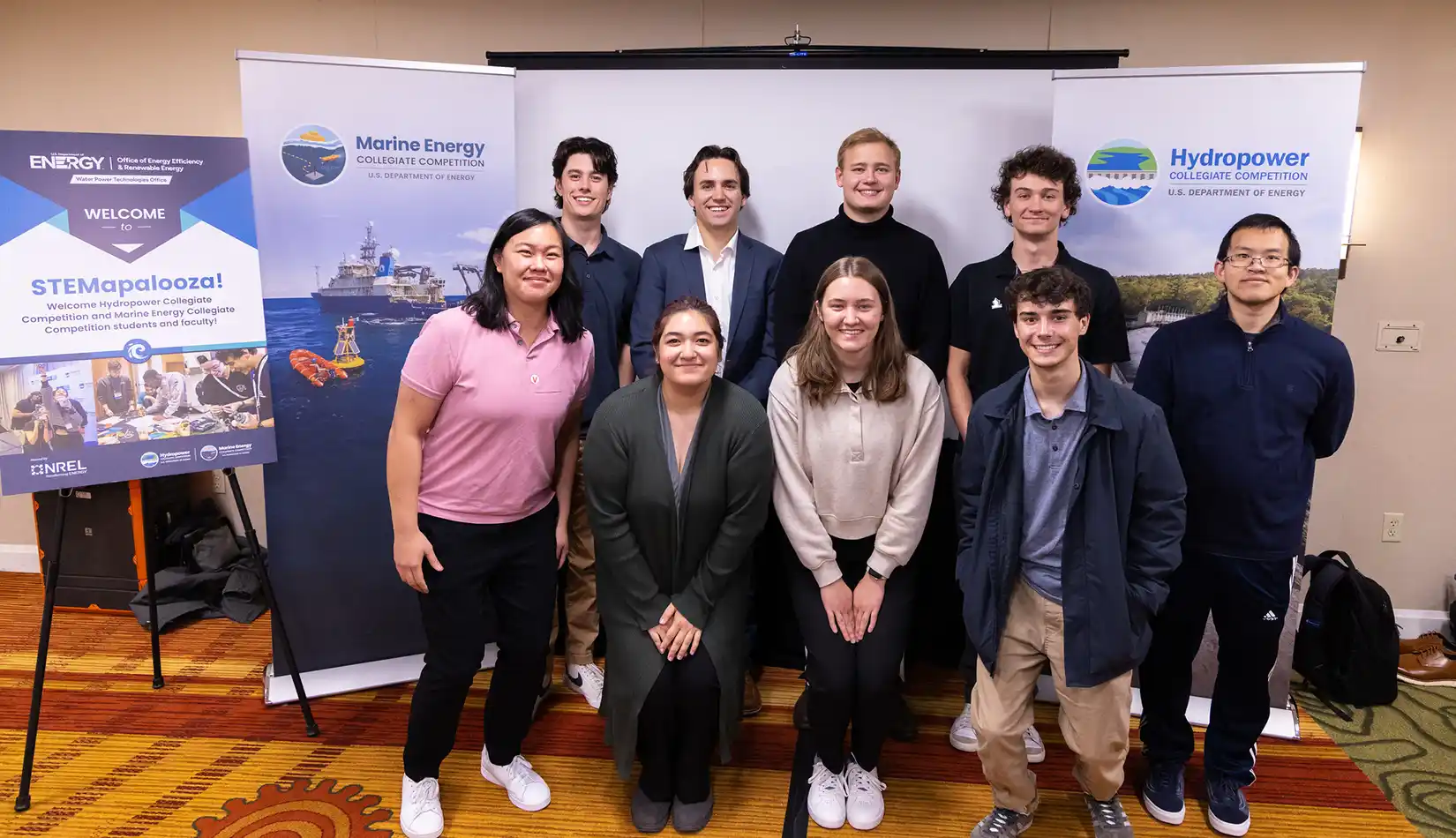Applications Open for Collegiate Competitions Aimed at Inspiring Future Water Power Workforce
Application Period Opens for Annual Marine Energy and Hydropower Competitions, Which Challenge College Students To Find Real-World Solutions and Explore Career Pathways

At the final MECC and HCC event, student teams present competition results. Photo by Agata Bogucka, NREL
Calling all student innovators looking to make waves in the water power sector! The application windows for the Hydropower Collegiate Competition (HCC) and Marine Energy Collegiate Competition are now open. Submissions will be accepted through Sept. 19, 2025.
Managed by NREL and funded by the U.S. Department of Energy's Water Power Technologies Office (WPTO), the competitions empower collegiate teams to solve complex marine energy and hydropower challenges for a chance to win cash prizes.
"These competitions are designed to find solutions for real energy challenges," said Elise DeGeorge, NREL's lead project manager for HCC. "By offering hands-on experience and industry connections, the competitions can open doors and help students gain insight into the expansive career opportunities in water power."
Hydropower Collegiate Competition Highlights
Roughly one quarter of the U.S. hydropower workforce is nearing retirement, and HCC helps pave the way for a new generation of innovators and entrepreneurs who want to advance hydropower technologies, make connections, learn from mentors, and discover a career path in hydropower.
The HCC 2026 competition, administered by NREL, aims to address hydropower challenges and explore opportunities using real-world concept development experiences. Teams must select from three development themes: in-conduit, non-powered dam, and pumped storage hydropower systems.
The competition, which culminates in the spring of 2026 with a presentation of hydropower concepts to a panel of industry experts, consists of five required challenges and one optional challenge.
Required Challenges
- Siting Challenge: Teams perform a hydropower site selection process followed by a feasibility assessment for their selected site.
- Design Challenge: Teams either create a conceptual design of their selected site or complete a detailed design for an individual component or system related to the development of their selected site from the siting challenge.
- Community Connections Challenge: Teams make connections with hydropower industry professionals and communities to deepen their learning.
- Design and Siting Poster Challenge: Teams create a poster summarizing their efforts throughout the competition, to be presented at the final event.
- Quick Pitch Challenge: Teams prepare a 90-second pitch that communicates the biggest takeaways from their year-long efforts.
Optional Challenge
- Build and Test Challenge: Teams build and test a scaled prototype of their concept.
Up to 15 teams will be selected to compete for cash prizes. Teams that participate in all required challenges will be eligible for up to $15,000 each in cash awards and will compete for part of the $20,000 grand prize cash pool. Teams that compete in the optional challenge will each be eligible for an additional $5,000 cash prize.
Marine Energy Collegiate Competition Highlights
With technology advancements, marine energy can power applications like autonomous vehicles for ocean exploration, battery and fuel cell technology for marine transportation, and water treatment for coastal and island communities. MECC empowers student teams to help shape the future of marine energy by developing solutions for coastal and maritime markets.
MECC teams will compete to solve challenges and gain experience in the emerging marine energy industry. The 2026 MECC has two distinct participation leagues:
- Kilowatt League, for teams new to the competition or those opting for a more flexible participation experience.
- Megawatt League, for teams seeking the full MECC experience with all challenges.
The competition offers six challenges, including four scored challenges and two optional unscored challenges. The Megawatt League must compete in all four scored challenges, and the Kilowatt League can select from a combination of scored challenges.
Scored Challenges
- Business Plan Challenge: Teams identify a promising market, create a business plan, and determine the best marine energy device to serve that market's needs.
- Technical Design Challenge: Teams design a marine-energy-powered device to serve consumers within the team's chosen market.
- Build and Test Challenge: Teams build and test a scaled prototype of their device.
- Community Connections Challenge: Teams make connections with marine energy industry professionals and communities to deepen their learning.
Bonus Challenges
- Poster Challenge: Teams create a poster summarizing their efforts throughout the competition, to be presented at the final event.
- Quick Pitch Challenge: Teams have 90 seconds to present their concept and findings from the challenges to attendees at the final event.
"Today's college students will shape tomorrow's marine energy technologies," said Arielle Cardinal, NREL lead project manager for MECC. "We're excited to help them kick off their plans for the future by providing a platform for designing, developing, and testing actual marine energy technology."
Up to 30 teams will be selected to compete for cash prizes. Each league, Kilowatt and Megawatt, offers a separate award pool. Teams that complete all required challenges will each be eligible to receive up to $5,000 in cash awards per submission package. Teams that successfully participate in all required challenges will also be eligible to compete for the grand prize award of up to $20,000.

MECC and HCC teams work to complete challenges, culminating in a final event hosted during an industry conference. Photo by Agata Bogucka, NREL
How To Compete
Undergraduate and graduate students from postsecondary institutions—including colleges, universities, community colleges, and trade schools—are invited to apply for both competitions. Applications do not require initial research or engineering.
Applications for HCC and MECC must be submitted by Sept. 19, 2025. Submissions will be reviewed by a panel of experts and teams will be selected by Sept. 24, 2025.
Students and faculty interested in participating in the 2026 competitions are encouraged to view the official competition rules to learn more about submission requirements, important dates, and eligibility:
- 2026 Marine Energy Collegiate Competition Official Rules
- 2026 Hydropower Collegiate Competition Official Rules
Stay up to date on other exciting research by subscribing to The SPLASH, NREL's newest newsletter for water power science, technology, engineering, and mathematics (STEM).
Learn more about STEM careers and workforce development opportunities on the Hydropower STEM Portal and Marine Energy STEM Portal.
Last Updated May 28, 2025
